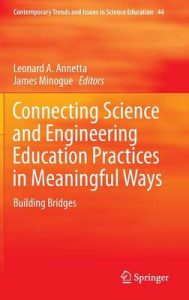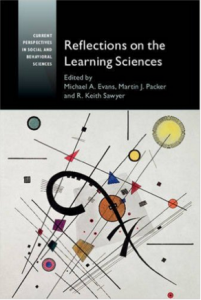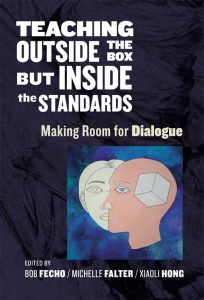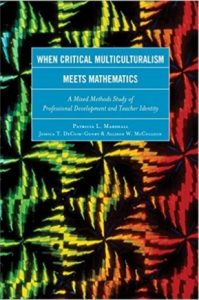2015-2016 Books and Publications
2015-2016

Annetta, L., & Minogue, J. (Eds.). (2016). Connecting Science and Engineering Education Practices in Meaningful Ways: Building Bridges. The Netherlands, Springer.

Evans, M. A., Packer, M. J., & Sawyer, R. K. (Eds.). (2016). Reflections on the Learning Sciences. Oxford University Press.

Fecho, B., Falter, M. M., & Hong, X. (Eds.) (2016). Teaching Outside the Box but Inside the Standards: Making Room for Dialogue. New York, NY: Teachers College Press.

Marshall, P. L., DeCuir-Gunby, J.T., & McCulloch, A. W. (2015). When critical multiculturalism meets mathematics: A mixed methods study of professional development and teacher identity. NY: Rowman & Littlefield Publishers.
Book Chapters
Anderman, E.M., & Gray, D. L. (in press). The roles of schools and teachers in fostering competence motivation. In A. J. Elliot, C. Dweck, D. S. Yeager (Eds.), Handbook of Competence and Motivation (2nd Edition): Theory and Application. New York: Guilford Press.
Beal, C. M. (2015). The contributions of Dr. John Arnold. Charlotte, NC: Information Age Publishing.
Beal, C. M. (2015). The contributions of Dr. James Beane. Charlotte, NC: Information Age Publishing.
Baggett, H.C.*, Simmons, C.*, Eggleton, S. R.*, & DeCuir-Gunby, J. T. (2016). “Cause they’re not learning for our world; they’re learning for theirs”: A critical race theory and phenomenological variant of ecological systems theory analysis of season 4 of The Wire. In Gaynor, T. S., & Taliaferro, J. D. (Eds.), Teaching The Wire: Frameworks, theories, and strategies for the classroom. Jefferson, NC: McFarland Publishing.
DeCuir-Gunby, J. T., Schutz, P. A., & Harris, S.D.* (2017). A future agenda for researching race and ethnicity in the study of motivation in educational contexts. In J. T. DeCuir-Gunby & P. Schutz (Eds.), Race and ethnicity in the study of motivation in education. (pp. 201-211). NY: Routledge.
Dick, L., White, T., Trocki, A., Sztajn, P., Heck, D., & Herrema (2016). Supporting Sense-making with Mathematical Bet Line. Teaching Children Mathematics, 22(9), 538-545.
Edgington, C., Sztajn, P. Wilson, P. H., Myers, M., & Webb, J. (2015). Norms for discussing students’ mathematics in professional development. Journal of Mathematics Education Leadership, 16 (1), 12-18
Edgington, C., Wilson, P. H., Sztajn, P. & Webb, J. (2016). Translating learning trajectories into usable tools for teachers. Mathematics Teacher Educator, 5 (1). Online Journal: http://www.nctm.org/Publications/Mathematics-Teacher-Educator/
Evans, M. A., Schnittka, C. G., Jones, B. D., Brnadt, C. B. (2016). In Annetta, L., Minogue, J. (Ed.), Studio STEM: A Model to Enhance Integrative STEM Literacy Through Engineering Design. Connecting Science and Engineering Education Practices in Meaningful Ways (vol. 44, pp. 107-137). Springer.
Gray, D. L., Hill, L. K., Wornoff, J. R., Bryant, L. H., Johnson, O. T., & Jackson, L. (in press). Examining associations between fitting in at school and heart rate variability among inner-city, African American adolescents. In J. T. DeCuir-Gunby & P. Schutz (Eds.), Race and ethnicity in the study of motivation in education. NY: Routledge.
Hofer, M., Lee, J. K., Slykhuis, D., & Ptaszynski, J. (2016). Opportunities and challenges of TPACK-based professional development on a global scale. In M. Herring, M. Koehler, M., & P. Mishra, (Eds.). Handbook of technological pedagogical content knowledge for educators, pp. 225-234 New York: Routledge.
Kupiainen, R., Leinonen, H., Mäkinen, M., and Wiseman, A.M. (2016) A digital book project with primary education teachers in Finland. Knobel, M. and Kalman, J. (Eds.). New literacies and teacher learning: Professional development and the digital turn. New York: Peter Lang.
Marshall, P. L., Manfra, M. M., & Simmons, C. G. (2016). No more playing in the dark: Twenty-first century citizenship, critical race theory, and the future of the social studies methods course. In A. R. Crowe & A. Cuenca (Eds.), Rethinking Social Studies Teacher Education in the Twenty-First Century (pp. 61-79). New York, NY/Switzerland: Springer International Publishing AG.
Moran, C. M., Young, C. A. (2016). In Mertens, S. B., Caskey, M. M., Flowers, N. (Ed.), Thematic units. Encyclopedia of middle grades education (2nd edition). Charlotte, NC: Information Age Publishing.
Myers, M., Sztajn, P. Wilson, P. H., & Edgington, C. (2015). From implicit to explicit: Articulating equitable learning trajectories based instruction. Journal of Urban Mathematics Education, 8 (2), 11-22.
Oliver, K. M., Weeks, T. S. (2015). Informing practice, policies, and procedures: A case study of external evaluation in support of a new virtual school. Online, Blended and Distance Education in Schools (pp. 87-103). Sterling, VA: Stylus Publishing.
Schutz, P. A., & DeCuir-Gunby, J. T. (2017). Researching race and ethnicity in the study of motivation in educational contexts: An introduction. In DeCuir-Gunby, J. T., & Schutz, P.A. (Eds.), Race and ethnicity in the study of motivation in education. (pp. 3-10). NY: Routledge.
Schutz, P. A., DeCuir-Gunby, J. T., Williams-Johnson, M. R. (2016). Using Multiple and Mixed Methods to Investigate Emotions in Educational Contexts. In Zembylas, M. & Schutz, P. A. (Eds.), Methodological Advances in Research on Emotion and Education, (pp. 217-229). NY: Springer.
Sondel, B. L. (2015). Market-Based Pedagogies: Assessment, Instruction, and Purpose at a “no excuses” charter school. Sense Publisher.
Sondel, B. L., Kretchmar, K., Ferrare, J. (2015). Mapping the education entrepreneurial network: Teach For America, charter school reform, and corporate sponsorship. New York, NY: Routledge.
Spires, H., & Kerkhoff, S. (2016). New literacies. In S. B. Mertens, M. M. Caskey, & N. Flowers (Eds.), The encyclopedia of middle grades education (2nd ed., pp. 282-286). Charlotte, NC: Information Age Publishing.
Spires, H. A., Medlock, C., & Kerkhoff, S. N. (in press). Digital literacy for the 21st century. In M. Khosrow-Pour (Ed.), Encyclopedia of information science and technology (4th ed.). Hershey, PA: IGI Global.
Spires, H., Zheng, M., & Bartlett, M. (2015). Digital gameplay: Effects on young adolescents’ science content learning. In K. Malu & M.B. Schaefer, (Eds.), Research on teaching and learning with the literacies of young adolescents (Vol. 10, pp. 75-95). Handbook of research in middle level education. Charlotte, NC: Information Age Publishing.
Sztajn, P., Borko, H., & Smith, T. (in press). Research on mathematics professional development. In J. Cai (Ed.), Compendium for Research in Mathematics Education. Reston, VA: National Council of Teachers of Mathematics.
Walkowiak, T. A. (in press). Mindset. In S. Mertens, M. Caskey, & N. Flowers (Eds.). The Encyclopedia of Middle Grades Education (2nd ed.). Charlotte, NC: Information Age Publishing.
Walkowiak, T. A. (in press). Third international mathematics and science study. In S. Mertens, M. Caskey, & N. Flowers (Eds.). The Encyclopedia of Middle Grades Education (2nd ed.). Charlotte, NC: Information Age Publishing.
Journal Articles
Barnes, E. M., Dickinson, D. K., & Grifenhagen, J. F. (2016). The role of teachers’ comments during book reading in children’s vocabulary growth. The Journal of Educational Research, 1-13.
Barnes, E.M., Grifenhagen, J.F. & Dickinson, D.K. (2016). Academic Language in Early Childhood Classrooms. The Reading Teacher, 70(1), 39–48. doi: 10.1002/trtr.1463
Beymer, P. N., & Thomson, M. M. (2015). The effects of choice in the classroom: Is there too little or too much choice?. Support for Learning, 30(2), 105-120.
Brewer, T.J., Kretchmar, K., Sondel. B., Ishmael, S., & Manfra, M.M. (2016). Teach For America’s preferential treatment: School district contracts, hiring decisions, and employment practices. Education Policy Analysis Archives, 24(15).
Carrier, S. J., Faulkner, V. N., Bottomley, L. J. Walking the walk: An integrated STEM project for elementary teachers. Journal of Interdisciplinary Teacher Leadership. 1(1), 25-29.
DeCuir-Gunby, J. T. & Gunby, Jr, N. W. (2016). Racial microagressions in the workplace: A critical race analysis of the experiences of African American educators. Urban Education, 51(4), 390-414.
Evans, M. A., Nino, M., Deater-Deckard, K., Chang, M. (2015). School-Wide Adoption of a Mathematics Learning Game in a Middle School Setting: Using the TPACK Framework to Analyze Effects on Practice. The Asia-Pacific Education Researcher, 24(3), 495-504.
Faulkner, V. N., Walkowiak, T. A., Cain, C., & Lee, C. W. (in press). Equality matters: The critical implications of precisely defining equality. Australian Primary Mathematics Classroom.
Gambino-Rhodes, A., & Lee, J. K. (2015) TPACK in the middle: Using Web 2.0 technologies to support project-based learning in a middle grades classroom. The Practitioner’s Guide to TPACK. Waynesville, NC: Association for the Advancement of Computing in Education.
Grant, S. G., Swan, K., & Lee, J. (2015). Bringing the C3 framework to life. Social Education, 79(5), 310-315.
Gray, D. L., Chang, Y., & Anderman, E. M. (2015). Conditional effects of mastery goal structure on changes in students’ motivational beliefs: need for cognition matters. Learning and Individual Differences, 40, 9-21. doi:10.1016/j.lindif.2015.03.025
Henderson, D. X., DeCuir-Gunby, J. T., & Gill, V.K.*. (in press). “It really takes a village”: A socio-ecological model of resilience among economically disadvantage ethnic minority youth. Journal of Primary Prevention.
Hill, L. K., Hoggard, L. S., Richmond, A. S., Gray, D. L., Williams, D. P., & Thayer, J. F. (in press). Examining the association between perceived discrimination and heart rate variability in African Americans. Cultural Diversity and Ethnic Minority Psychology.
Hoggard, L. S., Hill, L. K., Gray, D. L., Sellers, R. M. (2015). Capturing the cardiac effects of racial discrimination: Do the effects keep going? International Journal of Psychophysiology, 97, 163-170. doi: 10.1016/j.ijpsycho.2015.04.015
Jones, B. D., Chittum, J. R., Akalin, S., Schram, A. B., Fink, J., Schnittka, C. G., Evans, M. A., Brandt, C. B. (2015). Elements of Design‐Based Science Activities That Affect Students’ Motivation. School Science and Mathematics, 115(8), 404-415.
Kerkhoff, S. & Spires, H. (2015). Getting close to close reading: Teachers making instructional shifts in early literacy. Journal of Language and Literacy, 11(2).
Kretchmar, K., Sondel, B., & Ferrare, J. J. (2016). The power of the network Teach For America’s impact on the deregulation of teacher education. Educational Policy, 0895904816637687.
Lee, J., Hicks, D., Henriksen, D., Mishra, P., & & the Deep-Play Research Group, Michigan State University (2015). Historical soundscapes for creative synthesis. TechTrends, 59(5), 4-8.
Lee, J., Spires, H., Wiebe, E., Hollebrands, K., & Young, C. (2015). Portraits of one-to-one learning environments in a New Learning Ecology. International Journal of Learning, Teaching and Educational Research 10(3). Retrieved from http://www.ijlter.org/index.php/ijlter/article/viewFile/274/pdf
Lee, J., Swan, K., & Grant, S. G. (2015). By teachers, for teachers: The NYS toolkit and C3 teachers. Social Education, 79(5), 325-328.
Manfra, M.M., & Brown, S.** (2015). Digital history and the Holocaust: Student documentaries based on the C3 Framework. Social Education, 79(2), 111-114.
Manfra, M.M., & Greiner, J. A**. (2016). Technology and disciplined inquiry in the world history classroom. Social Education, 80(2), 123-128.
Marshall, P. L. (2015). Using my ‘you lie moment’ to theorize persistent resistance to critical multicultural education. International Journal of Multicultural Education, 17(2), 117-134.
Marshall, P. L., Jacot, A. L., Gamble, A. F. (2015). How elementary teachers imagine social studies in an age of teacher assessments. Social Studies Research and Practice. 10(2), 1-13. www.socstrp.org
McLeod, R., Grifenhagen, J. F., Hall, A. H. (in press). Blended practices for promoting literacy skills. Baltimore: Paul H. Brookes Publishing Co.
Minogue, J., & Borland, D. (2015). Investigating students’ ideas about buoyancy and the influence of haptic feedback. Journal of Science Education and Technology, 25, 187-202.
Moran, C., & Young, C. A. (2015). Questions to consider before flipping. Phi Delta Kappan, 97(2), 42-46.
Newbill, P. L., Drape, T. A., Schnittka, C. G., Baum, L., Evans, M. A. (2015). Learning across apace instead of over time. Afterschool Matters, 22, 4-12.
Nino, M., Evans, M. A. (2015). Fostering 21st-century skills in constructivist engineering classrooms with digital game-based learning. Tecnologias del Aprendizaje, IEEE Revista Iberoamericana de, 10(3), 143-149.
Oliver, K. M. (2015). Capturing global perspectives during study abroad. Online Classroom, 15(11), 1,3.
Oliver, K. M. (2016). Makerspace professional development, part I: Addressing “What?” and “Why?”. Tech Trends, 60(2), 160-166.
Oliver, K. M., Kellog, S. (2015). Credit recovery in a virtual school: Affordances of online learning for the at-risk student. Journal of Online Learning Research, 1(2), 191-218.
Oliver, K. M., Kennedy, K., Hibbard, L., Swan, B., Clark, T., LaFrance, J., & Oglesby, J. (2015). Personalization of learning: Lessons from RTT-D Winners. eLearn, 2015
(September), 1.
Pinter, H. H., Walkowiak, T. A., & Berry, R. Q. (2016). Three Ts: Using time, tasks, and talk to maximize students’ opportunities to learn. Published on Phi Delta Kappan Common Core Writing Project, www.kappancommoncore.org
Pruden, M., Kerkhoff, S., Spires, H., & Lester, J. (2016). Enhancing writing achievement through a digital learning environment: Case studies of three struggling adolescent male writers. Reading and Writing Quarterly: Overcoming Learning Difficulties.
Rutherford, T. A. (2015). Emotional well-being and discrepancies between child and parent educational expectations and aspirations in middle and high school. International Journal of Adolescence and Youth, 20(1), 69–85.
Simzar, R. M., Martinez, M., Rutherford, T. A., Domina, T., Conley, A. M. (2015). Raising the stakes: How students’ motivation for mathematics associates with high-and low-stakes test achievement. Learning and Individual Differences, 39, 49–63.
Slykhuis, D., & Lee, J. (2016). Using two frameworks to promote e-leadership and teacher development. In R. Huang, Kinshuk, J. K. Price (Eds.) ICT in education in global context: comparative reports of K-12 schools innovation, pp.233-248 New York: Springer
Sondel, B. L. (2016). “No excuses” in New Orleans: The silent passivity of neoliberal schooling. Educational Forum, 80(2), 171-188.
Sondel, B. L. (2015). Raising Citizens or Raising Test Scores? Teach For America, “no excuses” charters and the development of the neoliberal citizen. Theory and Research in Social Education, 43(3).
Sondel, B. L., Koch, J. G., Carrier, S. J., Walkowiak, T. A. (in press). Toward a theory of teacher education for justice-oriented STEM education. Catalyst.
Spires, H. (2015). Digital game-based learning: What’s literacy got to do with it? Journal of Adolescent and Adult Learning, 59(2), 125-130.
Spires, H., Himes, M., & Lyjak, E. (2016). Connecting classrooms to the future: Developing cross-cultural understandings through project-based inquiry. Literacy Today, 34(1), pp. 26-27.
Spires, H., Himes, M., & Wang, L. (2016). Cross-cultural inquiry in science. *Educational Leadership*, *74*(4), 72-74.
Spires, H., Kerkhoff, S., & Graham, A. (2016). Disciplinary literacy and inquiry: Teaching for deeper learning. Journal of Adolescent and Adult Literacy, 60(2), 51-61.
Spires, H. & Lester, J. (2016). Game-based learning: Creating a multidisciplinary community of inquiry. On the Horizon, 24(1).
Swan, K., Lee, J., & Grant, S. G. (2015). The New York State Toolkit and the Inquiry Design Model: Anatomy of an inquiry, Social Education 79(5), 316–322.
Swan, K., Lee, J. K., & Grant, S.G. (2015) A study of state social studies coordinators’ views of the Common Core. Journal of Social Studies Research 39(4), http://dx.doi.org/10.1016/j.jssr.2015.07.002
Thacker, E. S., Lee, J. K., & Friedman, A. M. (2016). Teaching with the C3 Framework: Surveying teachers׳ beliefs and practices. The Journal of Social Studies Resea ch. http://dx.doi.org/10.1016/j.jssr.2016.08.001
Thompson, K., Carvalho, L., Aditomo, A., Dimitriadis, Y., Dyke, G., Evans, M. A., Khosronejad, M., Martinez‐Maldonado, R., Reimann, P., Wardak, D. (2015). The synthesis approach to analysing educational design dataset: Application of three scaffolds to a learning by design task for postgraduate education students. British Journal of Educational Technology, 46(5), 1020-1027.
Thomson, M.M. (in press). A mixed-methods investigation: Involvement in a Research Experiences for Teachers’ (RET) professional development programme. SAGE Research Methods Cases Education, London, England: Sage Publications.
Thomson, M.M. (2016). Domain identification and stereotypes: Representations of scientists among Romanian elementary school students. International Journal of Higher Education Management, 2(2), 34-39.
Thomson, M.M. (2016). Metaphorical images of schooling: Beliefs about teaching and learning among prospective teachers from United States displaying different motivational profiles. Educational Psychology, 36(3), 502-525.
Thomson, M.M., DiFrancesca, D., Carrier, S., & Lee, C. (2016). Teaching efficacy: Exploring relationships between mathematics and science self-efficacy beliefs, PCK and domain knowledge among preservice teachers from the United States. Teacher Development, DOI: 10.1080/13664530.2016.1204355
Thomson, M.M., & Nietfeld, J. (2016). Beliefs systems and classroom practices: Identified typologies of elementary school teachers from the United States. The Journal of Educational Research, 109(4), 360-374.
Tugurian, L. P., & Carrier, S. J. (2016). Children’s environmental identity and the elementary science classroom. The Journal of Environmental Education, 1-11.
Walkowiak, T. A. (2016). Common Core brief: The place-value progression. Teaching Children Mathematics, 22(8), 453-457 plus online content.
Walkowiak, T. A. (2016). Five essential practices for communication: The work of instructional coaches. The Clearing House: A Journal of Educational Strategies, Issues and Ideas, 89(1), 14-17.
Walkowiak, T. A. (2015). Information is a Common Core dish best served first. Phi Delta Kappan, 97(2), 62-67.
Wilson, P. H., Sztajn, P., Edgington, C., & Myers, M. (2015). Teachers’ uses of a learning trajectory in student-centered instructional practices. Journal of Teacher Education, 66(3), 227-244.
Wiseman, A. M., Kupianinen, R., Mäkinen, M., (2016). Literacy through photography Multimodal and visual literacy in a third grade classroom. Early Childhood Education Journal, 44 (5), 537-544.
Wiseman, A., Kupiainen, R. and Mäkinen, M. (2015). Multimodal literacy and photography. Literacy practices that support and extend classroom learning. In T. Kaartinen (ed.) Monilukutaito kaikki kaikessa [Multiliteracy everything in one]. University of Tampere Teacher Training School, 220-238.
Won, S. S.G., Evans, M. A., Carey, C., Schnittka, C. G. (2015). Youth appropriation of social media for collaborative and facilitated design-based learning. Youth appropriation of social media for collaborative and facilitated design-based learning, 50, 385-391.
Won, S. S.G., Evans, M. A., Huang, L. (2015). Engagement and knowledge building in an after school STEM Club: analyzing youth and facilitator posting behavior on a social networking site. Learning, Media and Technology, 1-26.
Young, C. A. (2016). In Brown, A., Rodesiler, L. (Eds.), Game on: Multiple literacies in class, online, and at play. Developing contemporary literacies through sports: A guide for the English classroom. Urbana, IL: National Council of Teachers of English (NCTE).
Young, C. A., Moran, C. M. (Ed.), (Under contract / In press). Applying the flipped classroom model to English language arts education. Hershey, PA: IGI Global.
Proceedings
Edgington, C., Wilson, P.H., Webb, J., & Sztajn, P. (2015). Learning trajectories as boundary objects in professional development settings. Proceedings of the 39th Conference of the International Group for the Psychology of Mathematics Education. Hoburt, Tasmania, Australia: PME.
Gray, D. L., Allen, K. A., Jackson, L., Hill, L. K., Bryant, L. H. (2016, April). What else should we know about school belonging? Conceptual, methodological, and population considerations. Paper presented at the annual meeting of the American Educational Research Association, Washington, DC.
Gray, D. L., Leak, M. C., Lawson, A., Achin, D. C., Wornoff, J. R., Bryant, L. H. (2016, April). Considering scholarship as public knowledge: An agenda for educating a diverse public. Paper presented at the annual meeting of the American Educational Research Association, Washington, DC.
Lee, C. W. & Walkowiak, T. A. (2015). Novice elementary teachers’ instructional practices: Opportunities for problem solving and discourse. In Bartell, T. G., Bieda, K. N., Putnam, R. T., Bradfield, K., & Dominguez, H. (Eds.). Proceedings of the 37th Annual Meeting of the North American Chapter of the Psychology for Mathematics Education (pp. 1054-1061). East Lansing, MI: Michigan State University.
Lee, C. W. & Walkowiak, T. A. (in press). Teacher attributes and school context: What are the barriers to discourse in elementary mathematics? To appear in Proceedings of the 38th Annual Meeting of the North American Chapter of the Psychology for Mathematics Education. Tucson, AZ: University of Arizona.
Oliver, K. M. (2016). Encouraging teacher development of a personal learning network (PLN) in Twitter. Proceedings of Society for Information Technology & Teacher Education International Conference 2016. Chesapeake, VA: AACE.
Oliver, K. M. (2016). Promoting continuing computer science education through a massively open online course. Proceedings of Society for Information Technology & Teacher Education International Conference 2016. Chesapeake, VA: AACE.
Oliver, K. M., Cook, M. (2015). Capturing global perspectives during study abroad: A comparison of three visual tools. Proceedings of EdMedia: Worlds Conference on Educational Media and Technology 2015 (pp. 497-503). Chesapeake, VA: AACE.
Oliver, K. M., Pritchard, R. J. (2016). Multimodal composing with GoAnimate. Proceedings of Society for Information Technology & Teacher Education International Conference 2016. Chesapeake, VA: AACE.
Theisen, C., Williams, L., Oliver, K. M., Emerson, M.-H. (2016). Software security education at scale. Proceedings of the 38th International Conference on Software Engineering (ICSE).
Thomson, M. M., Walkowiak, T. A., & Lee, C. W. (2016). A mixed-methods investigation of teacher developmental trajectories: Results from a STEM-focused program. In Wahid, L. A. (Ed). Proceedings of the Fifth International Conference on Language, Education, and Innovation (pp.121-135). London: Interdisciplinary Circle of Science, Arts, & Innovation (ICSAI).
Walkowiak, T. A., Lee, C. W., & Whitehead, A. N. (2015). The development of mathematics instructional visions: An examination of elementary preservice teachers. In Bartell, T. G., Bieda, K. N., Putnam, R. T., Bradfield, K., & Dominguez, H. (Eds.). Proceedings of the 37th Annual Meeting of the North American Chapter of the Psychology for Mathematics Education (pp.968-971). East Lansing, MI: Michigan State University.
Whitehead, A. N. & Walkowiak, T. A. (2015). Preservice teachers’ understanding of fraction operations: Providing justification for common algorithms. In Bartell, T. G., Bieda, K. N., Putnam, R. T., Bradfield, K., & Dominguez, H. (Eds.). Proceedings of the 37th Annual Meeting of the North American Chapter of the Psychology for Mathematics Education (pp. 844-851). East Lansing, MI: Michigan State University.
Wilson, P.H., Edgington, C., Webb, J., & Sztajn, P. (2015). Teachers’ positioning in professional development: The case of age and grade. In T. Bartell, K. Bieda, R. Putnam, K. Bradfield, & H. Dominguez (Eds.), Proceedings of the 37th annual meeting of the North American Chapter of the International Group for the Psychology of Mathematics Education (pp. 852 – 859). East Lansing, MI. Michigan State University.
Zhang, D., Peng, X., Yalvac, B., Eseryel, D., Nadeem, U., Islam, A., Eyupoglu, T. F. (2015). Using peer-generated screencasts in teaching computer-aided design. Proceedings of the 123rd ASEE Annual Conference on Engineering Education. New Orleans, LA:. ASEE.